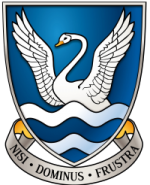“Two good tern parents deserve at least two chicks”
Two sixth form students from Glenlola Collegiate, Bangor and Royal Belfast Academical Institute have spent the summer helping the RSPB carry out research as part of a Nuffield Science Bursary project aimed to find out whether provisioning of chicks was sufficient to support a productive colony of common and arctic terns breeding on a small artificial island at Belfast Lough RSPB Nature Reserve. The students, supported by the RSPB education team, presented their Nuffield Science research at a celebratory event at Queen’s University Belfast recently.
The students watched the colony daily at high and low tide using a telescope from the clear and comfortable vantage point of the observation room. The students were concerned that, although there was plenty of appropriate oil rich high calorific value fish being brought into the colony during chick rearing, the egg clutch sizes were small typically with less than one chick per nest. This could indicate problems with food availability outside the geographical area, with adults perhaps returning in poor condition from their wintering grounds in West Africa or outside the research period – during courtship and incubation earlier in the season.
“We began also to look this year at where these two tern species are feeding.” said Hannah Geary, Glenlola Collegiate. “This information along with data from other similar scientific research could be useful to our Environment Minister and his committee as they implement the Marine Bill to include the creation of a coherent network of suitable places to designate as “Highly Protected Areas” or marine nature reserves for seabirds. The greatest skills these weeks of monitoring have taught me is how to begin to assess the health of the marine environment for myself and as a global citizen to appreciate that we have a responsibility to take a broader perspective and work with people all over the world if we are really to succeed in protecting our whole marine ecosystem. Through a DFID “Global schools Partnership” project between our school and one in Ghana, I initially became aware of the need to protect terns. When terns dive into the seas off West Africa, they help fishermen locate fish, often the only affordable source of protein for some of the poorest people in the world. I have learned so much more about these migratory seabirds through this research and, as a prefect for our neighbouring preparatory school, I have been able to design education resources to raise awareness with these children and the local community.”
The breeding population and productivity counts of chicks the students carried out have been entered into a RSPB national database for all breeding bird species and inform future conservation action for priority bird species.
“The reason we monitor certain species of birds on our reserves is to see how our management is progressing and how it could be improved.” said Chris Sturgeon, warden, Belfast Lough reserve. “Each year all of our reserves across the country monitor breeding birds specific to that site, putting the data collected from the surveys on the Annual Reserves Monitoring database. This lets the RSPB see how different species, particularly those of conservation concern, are doing on a national scale. It is fantastic, as part of our NIEA supported education programme, to have such competent and enthusiastic young people help us with this vital monitoring and also to pass on these vital monitoring skills to them.”
“Personally, this project has enabled me to develop and combine the communication skills acquired in GCSE English and the scientific skills developed in my A-level courses, to design a methodology to be used by subsequent students and produce my first scientific paper,” summed up Samuel Millar, Royal Belfast Academical Institute. “It should set me up well for future studies in both skills and confidence. The identification and monitoring skills I have learnt will also be of use in future employment as I continue to pursue my love of nature (especially butterflies and moths!) whether as part of, or alongside, my career.”
The RSPB Youth and Education Officer, reserve warden and Conservation Manager attended the event to cast a professional eye over the projects with a view to developing further ones in the future. There are plans to extend this research next year to involve more secondary schools in monitoring during courtship and incubation periods prior to breeding season to help build a more accurate picture of the health of the local marine environment.




